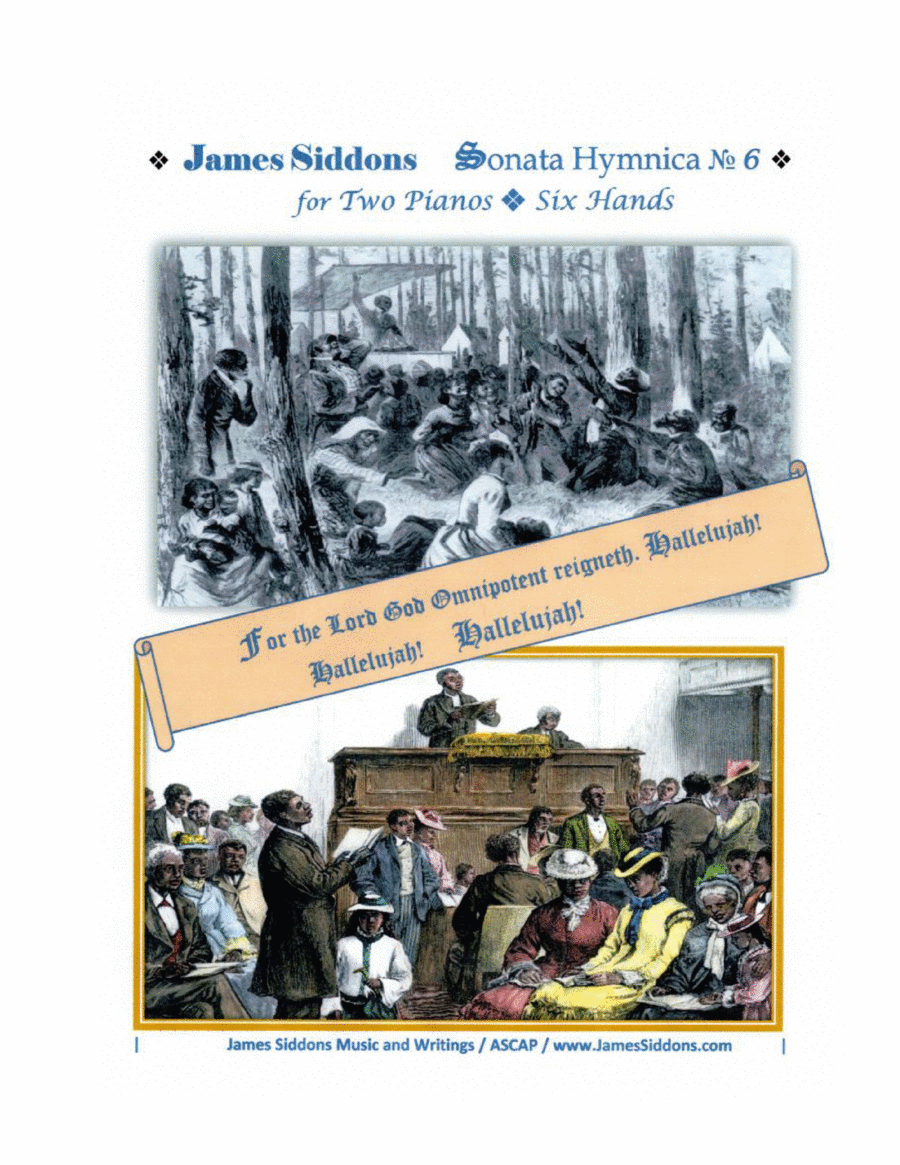2 Pianos,4 Hands,Piano Duet - Level 4 - Digital Download SKU: A0.972673 Composed by James Siddons. Contemporary,Folk,Jazz,Spiritual. Score. 25 pages. James Siddons Music and Writings #6698569. Published by James Siddons Music and Writings (A0.972673). Performance NoteSonata Hymnica No. 6 is scored for two pianos and three performers. One¬† performer (or player) sits at Piano I and may also serve as the conductor. At Piano II, Performer 1 plays from the treble¬† staff and Performer 2 plays from the bass staff. There are possible variations in this, such as having four pianos (two pianos¬† doubling the other two), or having two performers at Piano I, with Performer 2 playing only the bass-staff rhythmic pattern that¬† begins in measure 37. A standing conductor (not playing piano) may be desired. ¬†Although repetitive, the music in this sonata rarely repeats itself¬† exactly; hence, further minor improvisations by the performers are appropriate, keeping with the improvisatory nature of oral¬† tradition. Program¬†Note (for use in concert programs) by James Siddons ¬†The Sonata Hymnica series by James Siddons consists of piano solos that explore the world of American hymns and¬† vernacular religious songs in the 1880-1920 era, when rural and small-town churches relied on pianos for music, and, in an age before microphones and amplification, the acoustics of wooden floors, walls, and high ceilings. These sonatas are not hymn arrangements but explorations of the sounds that can be created by a piano in a reverberant environment, all the while keeping in mind the essential message of the familiar words¬† sung to the various hymn tunes. Sonata Hymnica No. 6 is the first in the series to be for piano¬†ensemble, and the second (after No. 3) to be based on the worship music of the 19th-century African American church. This sixth¬†sonata also explores the singing world of the black congregation and choir as well as the piano. Their singing was shaped¬† by the sounds and intonations of the piano and the heritage of European music behind it, as well as the contours and¬†cadences of the religious folk songs known as Spirituals. But the black congregations also sang hymns and choruses from the¬†Classical tradition, and the Spirituals became the basis of many adaptations by white arrangers. Thus, we may speak¬† of¬† standardized adaptations of Spirituals as white black music, and black performance styles of Classical works as black white music. Piano ragtime music is a non-religious example of white music (the military march) made into black white music by the blending in of the syncopated rag rhythm. Sonata Hymnica No. 6 explores the intermingling of these two strains¬†of American music as heard in the 19th-century black church. In his classic book The Souls of Black Folk (Chicago, 1903), W. E. B. Du Bois confesses to not being a musician but nonetheless finding himself enthralled by the music of the Southern 19th-century¬†African Americans. He refers to their singing as the Frenzy or ‚ÄėShouting,‚Äô when the Spirit of the Lord passed by, and seizing the¬† devotee, made him mad with supernatural joy . . . stamping, shrieking, and shouting, the rushing to and fro and waving of arms,¬† the weeping and laughing, the vision and the trance (p. 116). On another page, Du Bois speaks of . . . the songs of my fathers . . . swelling with song, instinct for life, tremendous treble and darkening bass (p. 163). Sonata Hymnica No. 6 uses the African call and response form as well¬† as percussive polyrhythms.
